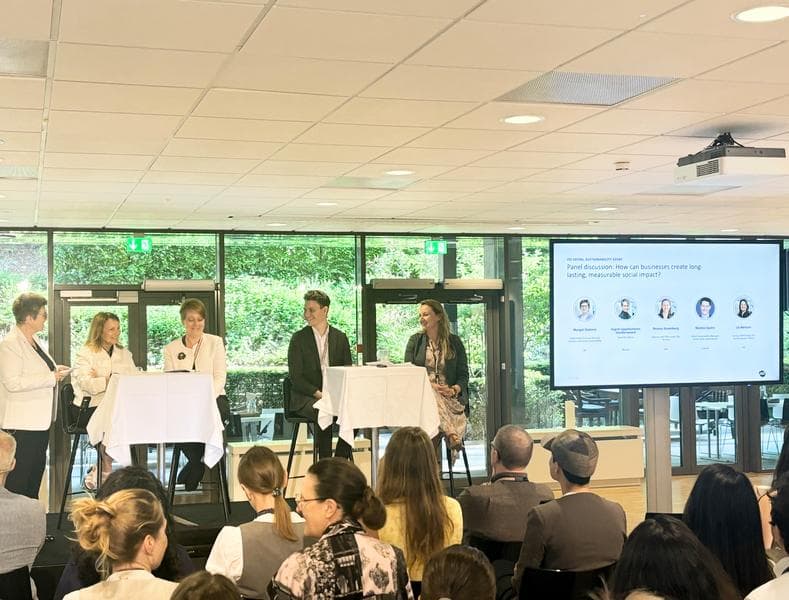Building an effective social sustainability strategy is now more important than ever and having measures in place can drive employee motivation and business success. A range of experts shared their views on how companies can develop their strategy during a Social Sustainability event at ISS’ Copenhagen HQ in May 2024:
The six levers to create social sustainability
Windō’s co-founder and Head of Social Impact, Ken Janssens, identified six levers that companies can pull to create social sustainability. The first one is to identify your company’s “superpower”, which is a unique capability or technology that you can use to drive sustainability. He referenced examples such as healthcare organisation Novo Nordisk which is the world’s largest insulin producer. They created a global network covering over 40 cities, to tackle urban diabetes.
The second lever to pull is a focus on partnerships as “no single company can be expected to solve the world’s challenges”. Engaging in partnerships with non-profit organisations allows companies to go deep on the issue and helps them step out of the corporate mindset to see the issue as others see it.
The third lever is to have programmes in place which lead to greater spending with diverse suppliers – businesses that are, for example, LGBTQ+-owned, ethnic minority-owned or women-owned.
The fourth lever is to empower employees by including them in sustainability initiatives, as this fosters innovation and boosts employee morale.
The fifth lever is to publicly advocate for social justice by signing public pledges for different diverse groups. Businesses which do not do this risk missing out on young talent when hiring.
The final lever is to be transparent about what you’re doing and how you’re making progress to inspire your employees, customers, investors and society at large.
Download our report on Unlocking the S in ESG
This report discusses the increasingly important role social sustainability is having in the workplace. We address how to create more inclusive work environments and how collaboration between companies and service providers means that we can create a better future together.
Download free report
It’s about the outcomes of initiatives, not the numbers
IKEA’s Global Director of Human Rights and Social Impact, Julia Olofsson, said there are three “wicked challenges” that are affecting our society – climate crisis and nature loss, rising inequality and unsustainable consumption.
IKEA’s main two KPIs in its strategy to tackle inequality are to prevent negative impact on people and increase positive impact on people.
One of its key learnings has been that companies need to measure the actual outcome of their sustainability initiatives on their people and not just track the number of people helped. Measuring outcomes could be through community engagement or how you have created a better business for now and future generations. Other learnings have been to identify the “why?” behind the strategy and understanding how a strategy will contribute to the business’ success.
Shifting social sustainability from being a differentiator to the norm
During the event’s panel discussion, Maersk’s Chief DEI Officer, Ingrid Uppelschoten Snelderwaard, said social sustainability drives more innovation and less attrition within a business and those, who do not engage in this strategy, risk losing talent in the market. She said “it is extremely important to be our authentic selves [in the workplace], it’s the right thing to do and it creates business value” and that we as companies have an opportunity to shift social sustainability from being a differentiator to being a standard practice for everyone.
Businesses can also develop their social sustainability through the implementation of living wages. Another panel speaker, Unilever’s Global Sustainability Manager - Social Equity and Inclusion, Matteo Squire, said is a “fundamental human right” for workers and that offering living wages “drives greater employee motivation and improved retention”.
BSR's Director and Office Lead for the Nordics, Renata Greenberg, added that the Living Wage Consortium has a critical role to play in making it easier for companies to follow the practice. This is by harmonising the living wage calculations and publishing a single ‘common’ number in any location, in every location, consistently presented, consistently updated and with open access for everyone when it comes to calculating the living wage.
Our Global Head of Diversity and Inclusion and Belonging, Margot Slattery, concludes: “The conversation in boardrooms and management meetings is evolving. We are moving beyond a sole emphasis on the “E” and giving deserved attention to the “S” [in ESG].”
“Social impact strategies are now being woven into the fabric of our sustainability efforts, and crucially, these strategies are being implemented through concrete, measurable actions.”







